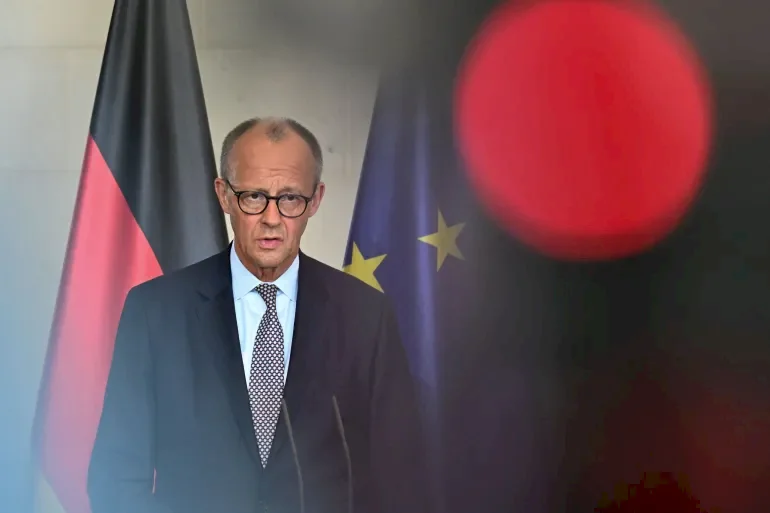
Will Germany's Position on Israel Change Due to Gaza?
SadaNews - Former Israeli ambassador Ilan Mor - in an article for Haaretz - affirmed that Israelis must understand that Germany does not intend to retreat from its commitment to Israel but seeks to fulfill it responsibly and with caution, as he put it.
Mor, a former ambassador to both Croatia and Hungary and deputy ambassador in Germany, continued by stating that Germany's historical commitment to Israel compels it to express its moral stance clearly, even with a close partner like Tel Aviv.
He added that the relationship between the two parties is not on the verge of breaking, but rather entering a new phase of mutual caution, for "the deep partnership - especially one rooted in painful memories - is measured not only by moments of solidarity but also by its ability to accommodate differences."
He further stated that the potential recognition of a Palestinian state represents a test for the relationship between the two countries, expressing hope that its foundations are strong enough to withstand current disagreements.
Unlike France, Britain, and Canada, Germany does not intend to recognize the state of Palestine next September, considering that such a step can be taken only after Israeli-Palestinian negotiations.
Historic Decision
He stressed that Israel and its people must listen to Germany and its principled arguments, recognizing that any disagreement is not necessarily a betrayal. However, he pointed out that Germany, in turn, must act "with sensitivity and wisdom befitting a relationship born from the flames of history, for Germany speaks not because it has forgotten but because it remembers well," as he expressed.
German Chancellor Friedrich Merz announced earlier this month that Germany will halt its military exports to Israel that could be used in the Gaza Strip, in response to the Israeli government's plan to control the city of Gaza.
In defense of the decision, Merz said in a statement to a German television channel at that time: "The Federal Republic of Germany has stood by Israel for 80 years. Nothing will change that, and we will continue to assist it in defending itself."
He emphasized that Germany's solidarity with Israel does not mean "that we have to consider every decision reached by the government as a good decision and support it to the extent of providing military assistance, including weapons."
There was public criticism within the "Christian Democratic Union" - led by Merz - concerning the partial arms ban imposed by the chancellor, including from the party's youth organization, which deemed the step inconsistent with the party's fundamental principles and Germany's values.
Enough Guilt
Observers note that Merz's tone towards Israel has hardened in recent months alongside the deteriorating humanitarian situation in Gaza.
Former ambassador Ilan Mor explains that Tel Aviv must follow Berlin's messages with concern, but he affirmed that Berlin - for its part - should avoid unilateral steps that could destabilize the region or "send wrong messages to Israel's enemies."
He mentioned that with the ongoing war in Gaza, and "the death of tens of thousands of victims, widespread destruction, and reports of a humanitarian collapse, the pressure against Israel has increased in Germany," accusing what he termed as "the radical left, representatives of Muslim immigrants, and progressive youth" of pushing towards a new policy encapsulated in "Enough guilt, yes to global responsibility."
Political and Military Earthquake
However, he clarified that the older generation and the centrist stream in German politics believe that the Holocaust imposes a special German commitment to Israel and its security.
It is noteworthy that Israeli writer Antonia Yamim had confirmed - in an article published by the Israeli newspaper "News 12" a few days ago - that Germany, by its decision to ban arms shipments to Israel, sends a clear and shocking message that after 80 years since the end of the Holocaust, the memory of the Holocaust no longer grants Israel automatic immunity.
The writer explained that the decision for the partial suspension of arms and military equipment exports to Israel marks a decisive shift, sending the message that Germany no longer provides automatic support to Israel.
She pointed out that this decision constitutes a political and military earthquake, since Germany is the second supplier of military equipment to the Israeli army after the United States, and it plays a pivotal role in supporting Israel politically and security-wise within Europe.
Source: Haaretz + Agencies

17 Martyrs in the Last 48 Hours in Gaza

11 Martyrs, Including Children and Women, in Israeli Airstrikes on Gaza

Arrests During Israeli Occupation Forces' Incursion into Various Areas of the West Bank

Report: Trump May Order Attack on Iran Next Sunday

Trump: Iran Wants to Reach an Agreement.. and Knows the "Deadline"

Shaath: Rafah Crossing will be opened in both directions starting next Monday

America Imposes Sanctions on Several Iranian Officials Including the Interior Minister

